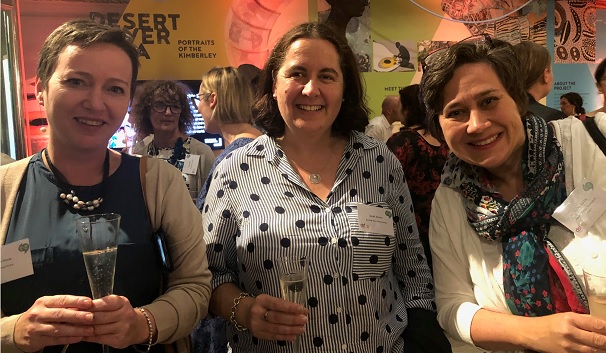The Language, Learning and Literacy conference – Kathy Rastle
6 RepliesKathy Rastle was another keynote speaker at last week’s great Language, Literacy and Learning conference whose topic is directly relevant to this blog.
You might remember her as a co-author of last year’s influential paper about Ending the Reading Wars, and of this related article (both highly recommended reading).
Hers was the final keynote of the conference, but I met her on the first day. Being a dairy farmer’s daughter who went to Warrnambool High School, I’m still always a little amazed when people with titles like Professor and Head of the Department of Psychology at Royal Holloway, University of London say “hi, I’m Kathy”, and are utterly smiley, nice, and not the least bit pretentious.
Here Kathy is (on the right) with the also-legendary and lovely Lyn Stone (on the left) and Sarah Awesome (AKA Asome) of Bentleigh West PS, (check out their NAPLAN Year 3 spelling gain here!) at the conference Sundowner drinks. However, in the interests of showing proper, gender-neutral academic respect I’ll use her surname from now on.
Shallow and deep phonics
18 Replies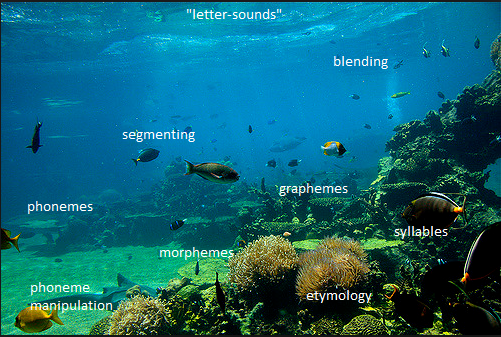
My last blog post copped a little flak for its focus on the Victorian Education Department’s top two pieces of advice for parents when their children are stuck reading a word, both of which start with the sentence, “Look at the picture.” (see p14 of this document).
This is very bad advice because it directs children’s attention away from the key information required for good word-level reading. It’s based on the idea of multi-cueing/the three-cueing system, which is scientifically-debunked nonsense. A complex but excellent explanation of why can be found here, and the actual role of context in reading is explained well here.
To read an unfamiliar word, children need to take it apart into spellings (graphemes) e.g. “n”, “igh” and “t”, not “ni”, “g” and “ht”, associate these with the relevant speech sounds (phonemes) and blend them into a word. With practice, familiar words are unitised in memory, via a process called orthographic mapping, and no longer need to be sounded out, they become instantly recognised.
Unfamiliar words of more than one syllable must be sounded out a syllable at a time. Earlier syllables must be held in memory while later syllables are worked out, making long words harder.
Once a printed word is converted into a spoken word, its meaning can be accessed, if it’s known. But even if a child doesn’t yet know what a word means (i.e. it’s not yet in their semantic memory), having heard it before (i.e. having it in their phonological memory) kick-starts the process of putting it into long-term memory for instant recognition. Over time the child can learn and refine its meaning(s), and how to use it, by hearing and seeing it in use. (more…)
THIS is a BORING book!
13 Replies
I’ve just watched a great 2016 BBC4 documentary called “B is for book”. It follows a group of London children from their first day at school for a year, and explores how they learn to read.
The kids live on a public housing estate in Hackney, and most speak languages other than English at home.
The film is not currently on the BBC website, but a few people have put it on YouTube. The version I watched is here, and you might like to keep it open in a new tab while you read, so you can quickly find and watch the interesting bits I describe below.
You’ll love all the children, but I was most entranced by a little boy called Stephan. An honest child with a low tolerance for Educrap, he looks and behaves a lot like a little boy I worked with last year, also a twin from public housing inclined to slide under the table.
At 19:42 on the video clock, the two children having the most difficulty learning to read in the film, Maria and Stephan, are asked, “What’s the hardest word you know how to spell?” First, they do this:
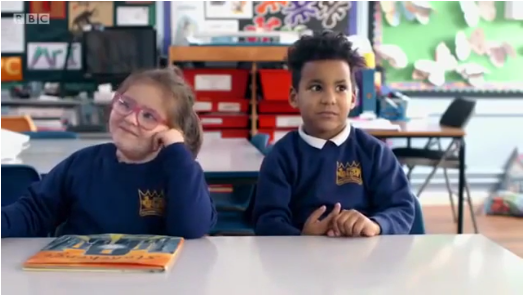
Decodable texts and lesson-to-text match
11 Replies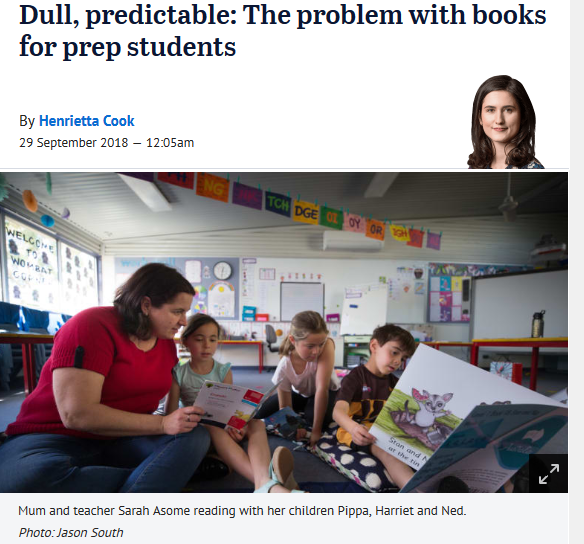
A state election looms here in Victoria, and parent-run group Dyslexia Victoria Support (DVS) is petitioning politicians to provide decodable books to all kids starting school in 2019.
Decodable books provide the reading practice for phonics lessons. They include sound-letter relationships and word types learners have been taught, plus usually a few high-frequency words with harder spellings needed to make the book make sense, which are also pre-taught.
Decodable books would replace the widely-used predictable/repetitive texts, which encourage children to guess and memorise words, not sound them out.
At the moment, children might be learning about “i” as in “sit” in phonics lessons, but take home a predictable text that might contain words like “find”, “ski”, “shield”, “bird”, “friend” or “view”. Instead of helping kids practise the sound-letter relationships they’ve been taught, their home readers can undermine this teaching.
DVS’s campaign hit the statewide media this weekend, yay, with an article called “Dull, predictable: the problem with books for prep students” in Fairfax newspapers.
Free Learning Difficulties Including Dyslexia webinars
8 Replies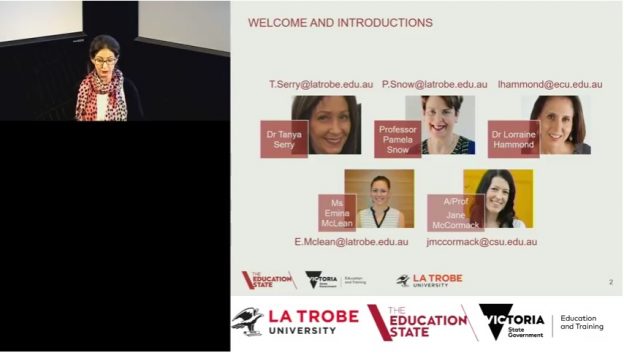
La Trobe University and the Victorian Department of Education have this year collaborated to run workshops across Victoria about learning difficulties including dyslexia. The workshops have been available to teachers and other Department of Education staff.
The information from these workshops is now being made available free online via YouTube as webinars. Wow. Amazingly generous of both the University and the Department, since most professional development of this type and quality is paywalled. So thanks to all involved.
The webinars are presented by Dr Tanya Serry from La Trobe University, and the workshops on which they are based were developed with Professor Pamela Snow, Ms Emina McLean and Assistant Professor Jane McCormack also from La Trobe, and Dr Lorraine Hammond from Edith Cowan University in WA. (more…)
Nobody advocates phonics-only literacy instruction
9 Replies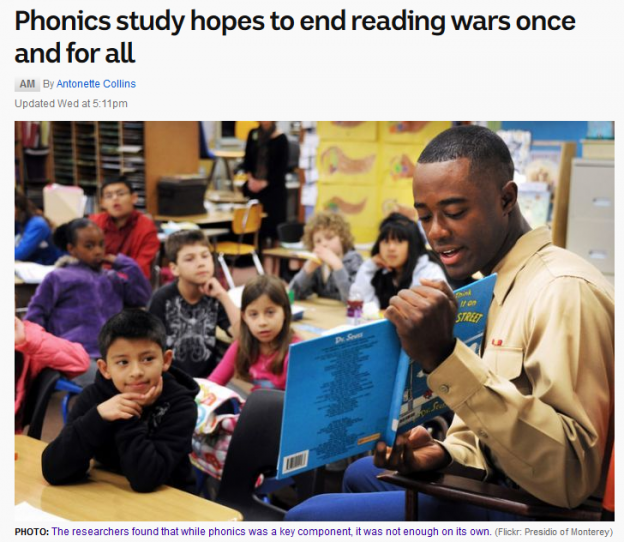
An important article by Anne Castles, Kathleen Rastle and Kate Nation summarising the process of learning to read from novice to expert, and seeking to end the “reading wars”, has just been published.
It’s written in plain English and freely available online. It says that phonemic awareness and phonics are vital and central during the early stages of learning to read, but that a lot of other things are involved in becoming a proficient reader. Please read it and share the link around.
Of course, the media’s antennae tend to be tuned to conflict not consensus, so one newspaper reports this with the headline, “Call off the reading wars, phonics wins: study“. The ABC also interviewed one of the authors, Anne Castles, who said a lot of tremendously sensible things as she always does (you can hear her in a radio report here), and also sought comment from Dr Paul Gardner of Curtin University’s School of Education.
Re ending the “reading wars” he said that, “the problem was with those who advocate phonics as the only approach” and added that “They tend to be people with no classroom experience … from speech pathology, cognitive psychology and think tanks”.
Now, I know not everything is about me, but I reckon I’m probably one of the people he is talking about, since I write a widely-read blog about phonics and am a speech pathologist.
If I wrote a blog about cycling, I’d be very surprised to hear anyone claim I was advocating cycling as the only means of transport. If I wrote a blog about pineapples, I doubt anyone would infer that I was advocating a pineapples-only diet. (more…)
What is an authentic text?
0 Replies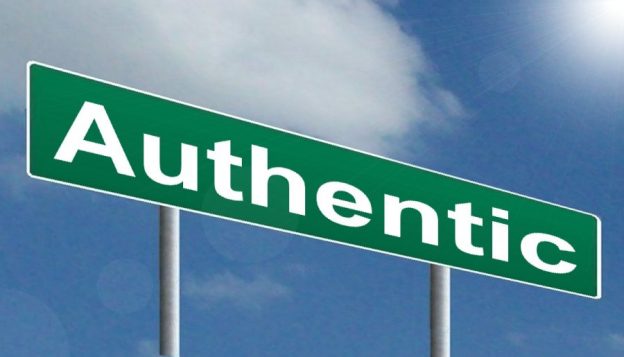
In linguistics and education, an “authentic text” is a text written for any purpose other than teaching/learning about language.
The word “authentic” doesn’t have its usual meaning in this context, nor its pejorative opposite “inauthentic”. It’s not a value-judgement.
The opposite of an authentic text is a text written for the purpose of language-teaching. This is a valid reason to write a text.
Authentic texts thus aren’t superior to language-teaching texts, they just serve a different purpose. (more…)

